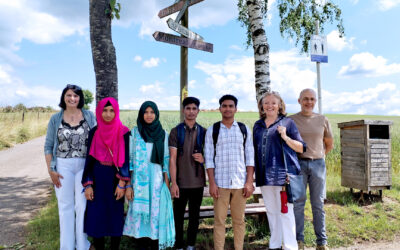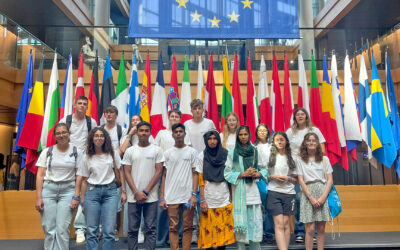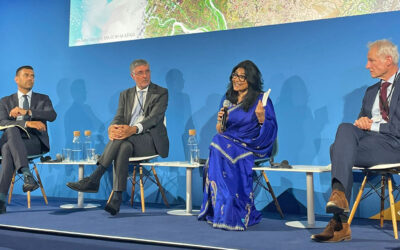Two Friendship school students participate in COP28 to share the experiences of their communities at the frontline of the climate crisis
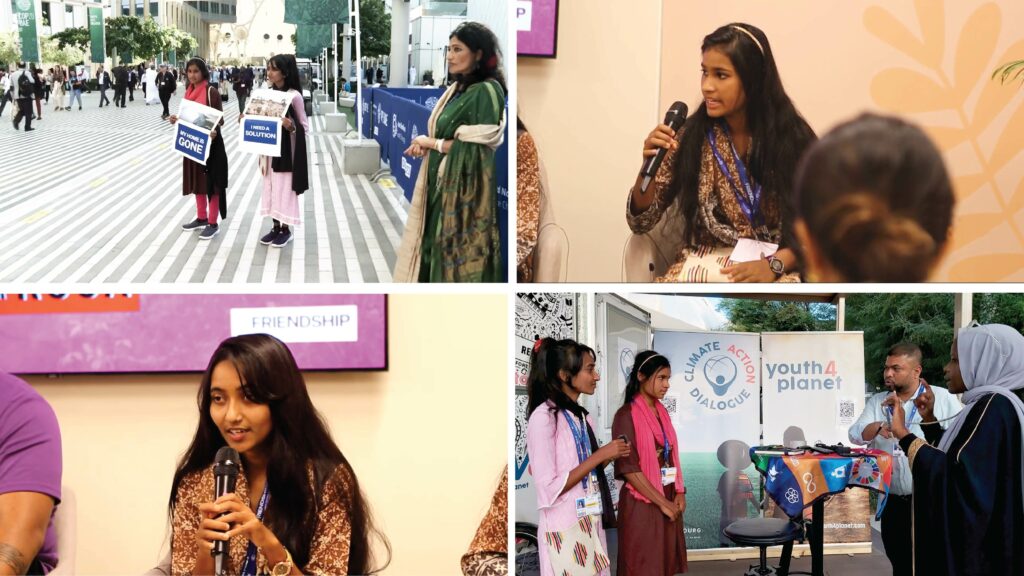
By Tahmeed Chaudhury
January 30, 2024
With the blue zone rife with arguments over the phasing down or out of fossil fuels, two teenage schoolchildren living on shifting riverine islands (chars) in northern Bangladesh stood in the Expo City in Dubai holding placards that read ‘My home is gone’ and ‘I need a solution’. The girls, Biuti Akhter of Friendship Secondary School Batikamari and Ronzina Akhter of Friendship Secondary School Nawshala, grew up in marginalised communities from remote, hard-to-reach areas at the forefront of the climate crisis.
The duo travelled to Dubai to participate in the recently concluded COP28 and contributed as speakers in various side-events, including at the Children and Youth Pavilion. On December 2, they shared their personal and their communities’ stories of suffering due the adverse impacts of climate change in a session titled “The Power of Resilient Youth Worldwide: Stories and Inspiration from Climate Change Frontline Fighters.” On December 6, in another session titled “Sharing Experiences Through Storytelling and Art”, they exchanged dialogue with a group of youth climate activists from impacted countries, sharing similar stories of struggle and wanting to raise their voices to pressure richer, more developed countries into taking impactful actions.
Biuti and her family had to relocate after a devastating flood destroyed her home and eroded the land that her village stood on 2023. Speaking at the session, she said “Floods are very common and we suffer almost every year. Food crises and water borne diseases are every common. This year (2023), we had floods for 45 days.”
Ronzina reiterated, “Climate change is real. Not just for me, but there are thousands like me who are suffering. So, we must take action. We need to find ways to fight against climate change.”
In Friendship’s working areas in the northern riverine regions of Bangladesh, communities in shifting sandbar islands regularly lose their homes and lands to river erosion and are forced to migrate to save their lives, possessions and livelihoods. They are left with few options than to rebuild from scratch after enduring endless humanitarian challenges.
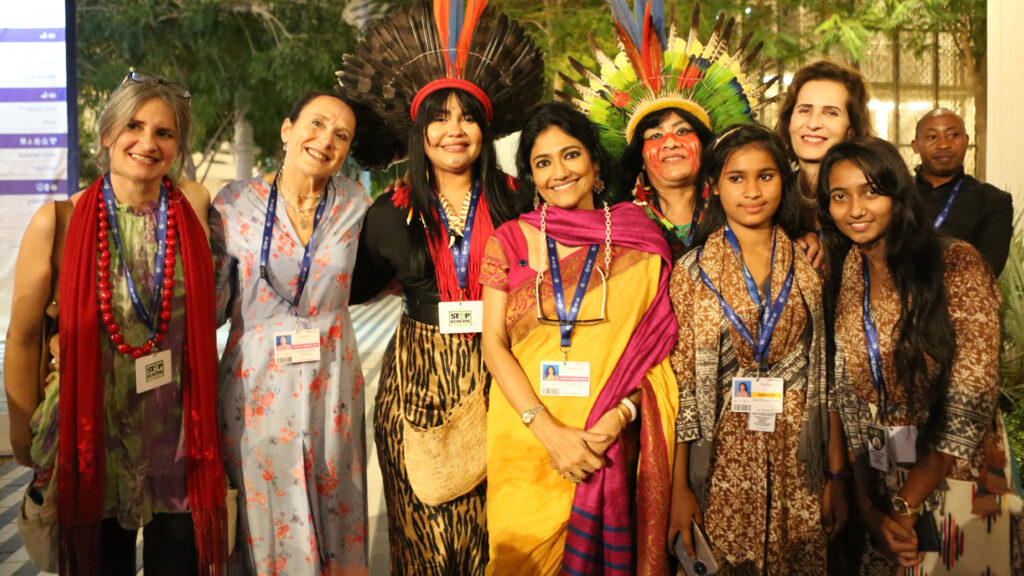
Besides participating in side-events in the Blue Zone, the girls attended a number of other events in the green zone and took part in peaceful processions to demand immediate solutions and adaptation finance. They further interacted with notable personalities from Bangladesh and beyond, including Nasrul Hamid MP, Saber Hossain Chowdhury MP and Inger Anderson, Executive Director of United Nations Environment Programme (UNEP). The girls were also featured in various national and international news media, including Banglavision and Ekhon TV from Bangladesh, Arte TV from France, NOS TV from the Netherlands and Ketnet TV and VRT from Belgium.
On their return, the girls looked inspired and buoyed by the experience of travelling to a foreign land whereas they hadn’t previously travelled out of their respective villages, of engaging with like-minded activists from different nations and of sharing their stories in a platform as enormous as COP.
“I met people from many countries and learned a little about their language and culture and exchanged tales of shared suffering,” says Biuti. When asked what message she left for the international community at the summit, she continued, “I told them our village was very beautiful before, but because of the emissions produced by developed countries such as theirs, it has been devastated.”
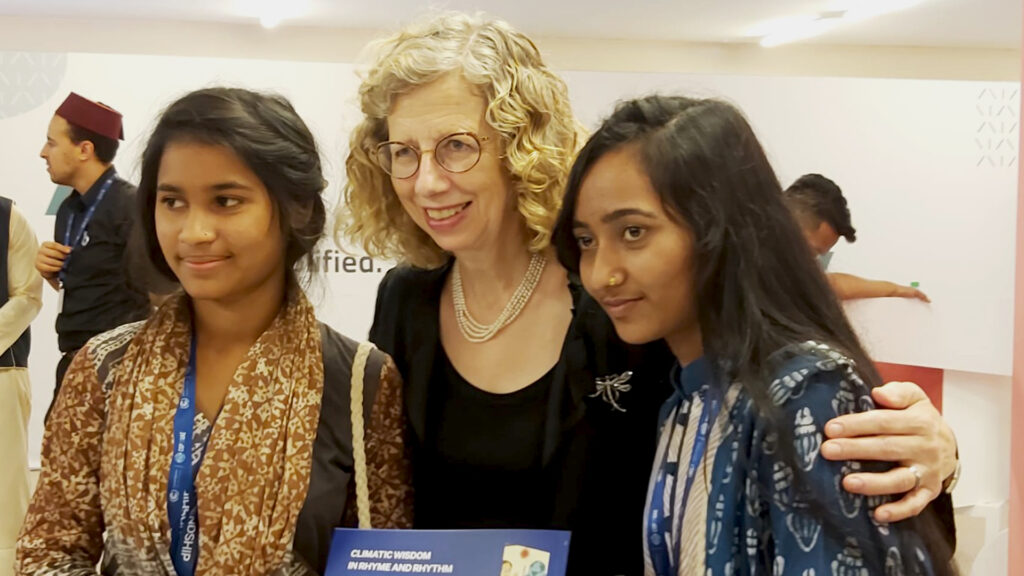
Ronzina felt the need to raise her voice for a loss and damage fund, a much speculated and discussed measure at the COP summits in recent years. “Our homes are being destroyed; we have to shift from one place to another, and incur enormous expenses to rebuild. Our economy is dependent on farming. If our land breaks apart, how will we make an income? Because of our challenges, I said they should provide loss and damage and compensate our suffering.”
COP28 marked Friendship’s fourth appearance in COP summits, taking voices of communities impacted by climate change in Bangladesh to Dubai. Friendship hosted three side events and participated in a handful of others (see full programme and re-watch online here: https://friendship.ngo/cop28/). For the first time, the organisation took representatives from impacted communities in its working areas, Biuti and Ronzina, to attend the summit in person.


